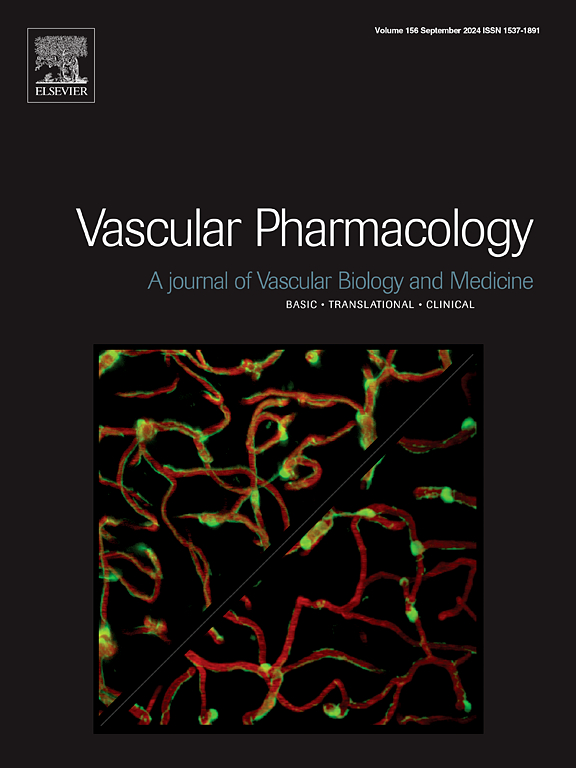n -糖基化特征及其与心血管免疫代谢的相关性。
IF 3.5
3区 医学
Q2 PHARMACOLOGY & PHARMACY
引用次数: 0
摘要
糖基化是一种翻译后修饰,其中复杂的、支链的碳水化合物(聚糖)共价地附着在蛋白质或脂质上。天冬酰胺连接蛋白(N-)糖基化是最常见的糖基化类型之一。这一过程对许多生物和细胞功能至关重要,并且n -糖基化受损与炎症和心血管疾病广泛相关。已经使用了不同的技术方法来增加n -聚糖的覆盖范围,揭示了聚糖的高度复杂性,包括它们的结构和在蛋白质上的附着位点。在此背景下,基因组研究的新见解揭示了糖基化的遗传调控,将遗传变异与总血浆n -糖基化和免疫球蛋白G (IgG)的n -糖基化联系起来。此外,RNAseq方法已经揭示了参与聚糖结构的糖酶的一定程度的转录调控。然而,我们对心血管风险和糖基化之间的关系的理解仍然有限,这是由遗传和环境因素的复杂叠加决定的。大多数情况下,已经报道了不同人群的血浆n -糖基化谱或动脉粥样硬化模型中特定酶功能的实验研究。大多数未发现的糖基化与病理机制的关联围绕着炎症细胞向血管壁的募集和脂蛋白代谢。本综述旨在总结组学研究对n -糖基化的免疫和代谢调节及其与心血管和代谢性疾病风险的关联的见解,并从实验模型中提供机制见解。糖组学和糖蛋白组学的新兴技术与已经实现的组学方法相结合,可以在单细胞分辨率上绘制转录组学、表观基因组学和代谢组学图谱,这将加深我们对糖基化分子调控的理解,并确定心血管疾病预防和治疗的新生物标志物和靶点。本文章由计算机程序翻译,如有差异,请以英文原文为准。

N-glycosylation signature and its relevance in cardiovascular immunometabolism
Glycosylation is a post-translational modification in which complex, branched carbohydrates (glycans) are covalently attached to proteins or lipids. Asparagine-link protein (N-) glycosylation is among the most common types of glycosylation. This process is essential for many biological and cellular functions, and impaired N-glycosylation has been widely implicated in inflammation and cardiovascular diseases. Different technical approaches have been used to increase the coverage of the N-glycome, revealing a high level of complexity of glycans, regarding their structure and attachment site on a protein. In this context, new insights from genomic studies have revealed a genetic regulation of glycosylation, linking genetic variants to total plasma N-glycosylation and N-glycosylation of immunoglobulin G (IgG). In addition, RNAseq approaches have revealed a degree of transcriptional regulation for the glycoenzymes involved in glycan structure. However, our understanding of the association between cardiovascular risk and glycosylation, determined by a complex overlay of genetic and environmental factors, remains limited. Mostly, plasma N-glycosylation profiling in different human cohorts or experimental investigations of specific enzyme functions in models of atherosclerosis have been reported. Most of the uncovered glycosylation associations with pathological mechanisms revolve around the recruitment of inflammatory cells to the vessel wall and lipoprotein metabolism. This review aims to summarise insights from omics studies into the immune and metabolic regulation of N-glycosylation and its association with cardiovascular and metabolic disease risk and to provide mechanistic insights from experimental models.
The combination of emerging techniques for glycomics and glycoproteomics with already achieved omics approaches to map the transcriptomic, epigenomic, and metabolomic profile at single-cell resolution will deepen our understanding of the molecular regulation of glycosylation as well as identify novel biomarkers and targets for cardiovascular disease prevention and treatment.
求助全文
通过发布文献求助,成功后即可免费获取论文全文。
去求助
来源期刊

Vascular pharmacology
医学-药学
CiteScore
6.60
自引率
2.50%
发文量
153
审稿时长
31 days
期刊介绍:
Vascular Pharmacology publishes papers, which contains results of all aspects of biology and pharmacology of the vascular system.
Papers are encouraged in basic, translational and clinical aspects of Vascular Biology and Pharmacology, utilizing approaches ranging from molecular biology to integrative physiology. All papers are in English.
The Journal publishes review articles which include vascular aspects of thrombosis, inflammation, cell signalling, atherosclerosis, and lipid metabolism.
 求助内容:
求助内容: 应助结果提醒方式:
应助结果提醒方式:


